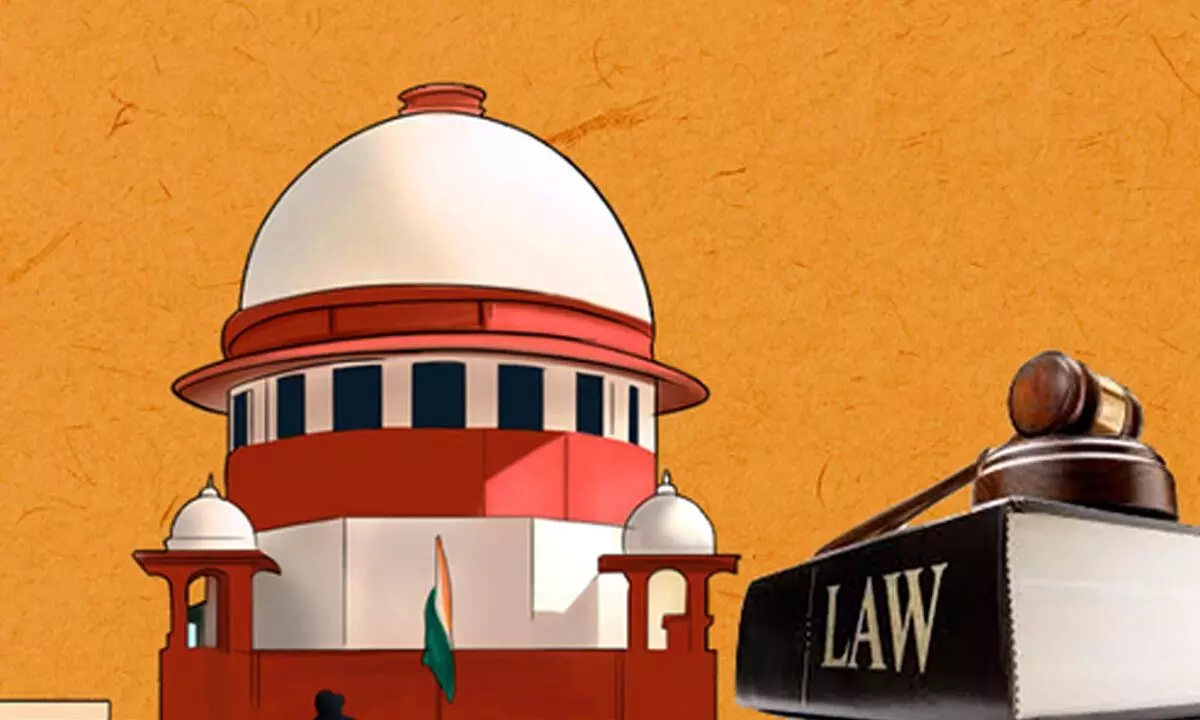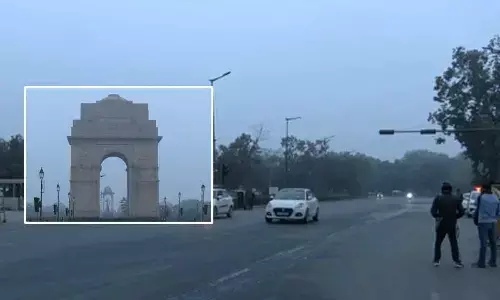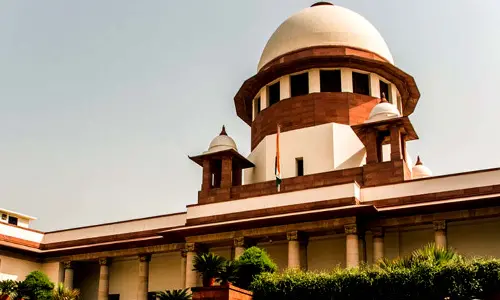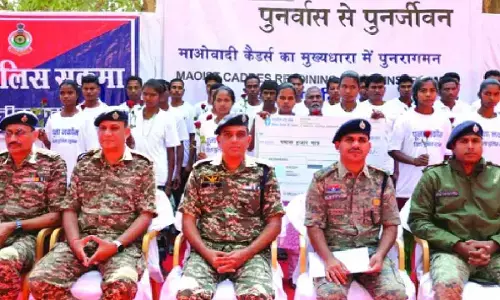Explainer: Challenges to electoral bonds scheme in Supreme Court
Share :

Supreme Court of India
The Constitution bench of Chief Justice of India D.Y. Chandrachud, Justices Sanjiv Khanna, B.R. Gavai, J.B. Pardiwala and Manoj Misra heard the arguments made by petitioners challenging the electoral bond scheme on Tuesday and Wednesday. IANS presents all you need to know about the scheme and the challenges to it.
New Delhi: The Constitution bench of Chief Justice of India D.Y. Chandrachud, Justices Sanjiv Khanna, B.R. Gavai, J.B. Pardiwala and Manoj Misra heard the arguments made by petitioners challenging the electoral bond scheme on Tuesday and Wednesday. IANS presents all you need to know about the scheme and the challenges to it.
What are electoral bonds?
Electoral bonds are interest-free bearer bonds or money instruments that can be purchased by companies and individuals in India from authorised branches of the State Bank of India (SBI).
These bonds are sold in multiples of Rs 1,000, Rs 10,000, Rs 1 lakh, Rs 10 lakh, and Rs 1 crore. They can be purchased through a KYC-compliant account to make donations to a political party. The political parties have to encash them within a stipulated time.
The name and other information of the donor are not entered on the instrument and thus electoral bonds are said to be anonymous.
There is no cap on the number of electoral bonds that a person or company can purchase.
The government brought in amendments to four Acts to introduce the Electoral Bond Scheme via the Finance Act of 2016 and 2017.
These acts are Representation of the People Act, 1951, (RPA), the Companies Act, 2013, the Income Tax Act, 1961, and the Foreign Contributions Regulation Act, 2010 (FCRA), through the Finance Acts of 2016 and 2017.
Before the scheme was introduced the political parties had to make public all donations above Rs 20,000. Also, no corporate company was allowed to make donations amounting to more than 7.5% of their total profit or 10% of revenue.
Who can receive funding via electoral bonds?
Political parties that secured at least 1% of the votes polled in the recent Lok Sabha or State Assembly elections and are registered under the RPA can get a verified account from the Election Commission of India (ECI). The bond amounts are deposited in this account within 15 days of their purchase.
The political party has to encash the amount within those 15 days, the amount received as a donation gets deposited into the Prime Minister's Relief Fund. These bonds, however, are not available for purchase all the time. They are available for a period of 10 days in a gap of four months (January, April, July and October). They are also open for 30 days in Lok Sabha election years.
Challenges to the scheme in the Supreme Court:
Since the five-judge constitutional bench commenced hearings on October 31, several arguments have been made against the constitutionality and legality of the Electoral Bond Scheme and the threat it poses to Indian democracy by petitioners lawyers including senior advocates Prashant Bhushan, Nizam Pasha, Kapil Sibal, Vijay Hansaria, Sanjay Hegde and Advocate Shadan Farasat.
1) Violates Right to Information:
It has been so far argued in the court that the Electoral Bond scheme violates the citizen's fundamental right to information under Article 19 (1) a, about political parties. Citing previous judgements of the top court, Bhushan asserted that if the citizens have the right to know about candidates then they certainly have the right to know about who is funding the political party as well.
2) Enables backdoor lobbying and quid pro quo:
Bhushan told the court that there is circumstantial evidence to prove that there were kickbacks being paid by corporations via electoral bonds to political parties in power to get favours for the corporations.
He highlighted that almost all bonds have been received by the party in power.
He said that donations to Electoral Bonds from Vedanta Limited, a company that has been declared as the preferred bidder for various mining licences, went up despite reports of a financial crunch. Citing individual cases like Vedanta, the petitioners have made a case that the scheme provides curtain veil for cases of backdoor lobbying by corporations.
3) Opens doors to shell companies:
It has been argued that since the government removed the limit of 7.5 per cent of the annual profit for companies to make donations to political parties and allowed Indian subsidiaries of foreign companies to make donations, shell companies can now also be used to make donations.
Bhushan told the court that the amendments to FCRA mean that even a loss-making company or a company that does no business (a pure shell company) can also donate.
4) Opaque instrument that is not entirely anonymous:
It has been argued that Electoral Bonds are opaque instruments that are not entirely anonymous. As nobody can come to know other than the government who contributed to whom. Since the SBI comes under the government, donations to the opposition can come under scrutiny by an investigative agency, which leads to selective anonymity.
Bhushan also argued that this anonymity of electoral bonds had raised suspicions of corruption and that donors may use these bonds to provide kickbacks to political parties in exchange for policy favours as the secrecy of these donations makes it difficult to trace any quid pro quo agreements.
The CJI while listening to Bhushan's argument pointed out that a point he may explore is that this scheme anonymised donations in relation to the rest of the society and not the donee.
"Another point you may want to also explore is that this is not an anonymised donation in relation to a donee. It's anonymised in relation to the rest of society. The donee may or may not but could know of the sources."
5) Can be used for any other purpose than Elections:
Sibal in his argument has submitted before the court that the name "Electoral Bond" is a misnomer as the money can be used for any purpose after it is withdrawn since no one is asking how the parties spent the money.
"There is nothing in the scheme which connects the donations made to the participation in the electoral process. It's a means for political parties to be enriched," he explained. To this, the CJI asked if there was no spending requirement.
Sibal replied, "None! You can spend this money, however. You can build your office. You can set up a whole internet network throughout the country."
6) Promotes corruption:
Sibal told the court that if required the account can be closed anytime by the political party. He also submitted before the court that this is a scheme to protect criminals from being prosecuted under the Prevention of Corruption Act (PCA) and Prevention of Money Laundering Act (PMLA).
"Please read Section 7 of the Prevention of Corruption Act...This is also true under the PMLA. Because a predicate offence has been committed but no proceeds of crime - you'll never know...You never know who bribed whom, how much was the bribe, what quid pro quo was there - you never get to know."
It has also been argued that reducing the disclosure threshold from Rs 20,000 to Rs 2,000 might not reduce the use of cash in politics and promote intended transparency. As earlier political parties declared that they received a certain amount in small donations below Rs 20,000. Now the same can be done for Rs 2000.
Bhushan also presented before the court that in the last five years since the electoral bonds scheme was introduced, the contribution to political parties by way of electoral bonds has far exceeded any other method.
"The limit fixed per candidate is less than Rs 1 cr (Rs 95-75 lakh depending on the state). The total spent can be less than 500 crore in Lok Sabha. One party is getting more than 10 times the amount. Please see this is affecting our democracy," he said.
7) Eliminates level playing field for political parties in Opposition:
"More than 50 per cent have been received only by the ruling party at the Centre and the rest have only been received by the ruling party in States...Not even 1 per cent has been received by opposition parties that aren't ruling in opposition states," Bhushan said in court.
Bhushan told the court that virtually all bonds have been purchased by corporates saying that nearly 95 per cent are in the denomination of 1 crore and above.
He highlighted that the Centre through this scheme has also removed the cap on corporate donations and amended FCRA. "It destroys and disturbs democracy in the country. Because it does not allow a level playing field between political parties which are ruling versus opposition parties; or between political parties and independent candidates."
8) Differentiates between corporations and citizens:
Sibal while making his argument in the court highlighted that the scheme gives anonymity to corporate donors but citizens who are donating Rs 2000 in cash will disclose their names. This may also lead to the overshadowing of citizens' voices by corporates in a democracy.
9) Unfair to the shareholder investing in Companies:
Sibal argued that the shareholders in a company put in their money to ensure that the corporation functions within the framework of the MoU. By donating to Electoral Bonds the company is not informing the shareholders as to how their money is going to be spent.
10) No way to stop trading of electoral bonds:
While listening to the arguments made by Sibal against the scheme, the CJI remarked that even as trading of electoral bonds is prohibited, there is no way to stop it. The CJI while listening to Sibal also added that the person could be an aggregator of bonds and may give the bonds to ten others.
11) Does not reduce black money:
Advocate Farasat appearing for the CPI (M) submitted before the court that the electoral bonds scheme did not primarily aim to reduce black money but rather aimed to reroute non-anonymous funding from normal banking channels to anonymous Electoral Bonds.
Farasat called the scheme an "alternative white money channel" created by the government to replace the already existing disclosure-based channels, such as RTGS, bank drafts, and cheques with added anonymity.














